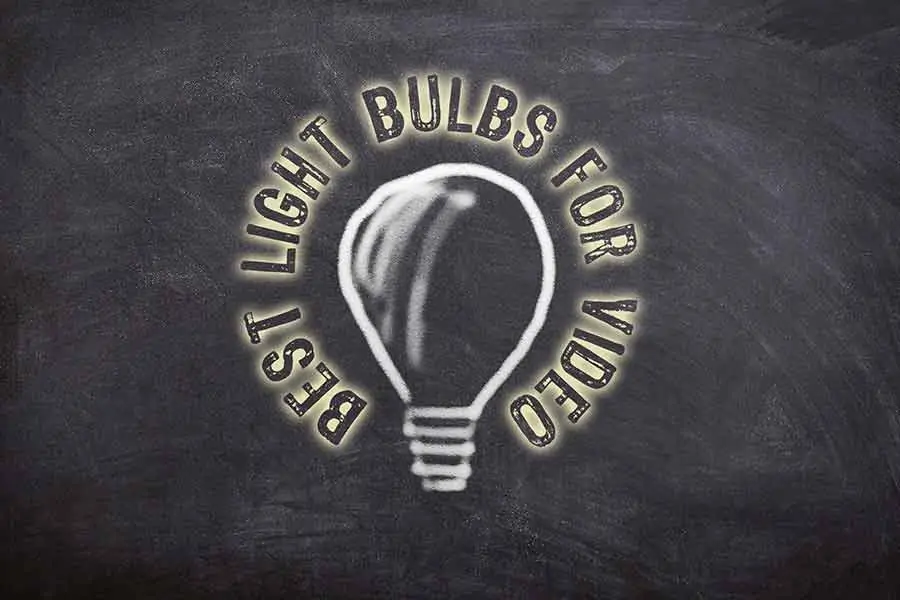DIY Video Studio is supported by its readers who use the affiliate links or ads on this site. As an Amazon Associate, I earn from qualifying purchases. Thank your support if you use any of the links.
Without light, you can’t shoot videos, and without good lighting, you’ll find it difficult to get great looking video footage. So you need to know about lighting techniques, lighting kits like portable softbox lights, and of course, which are the best light bulbs for video recording or indeed photography.
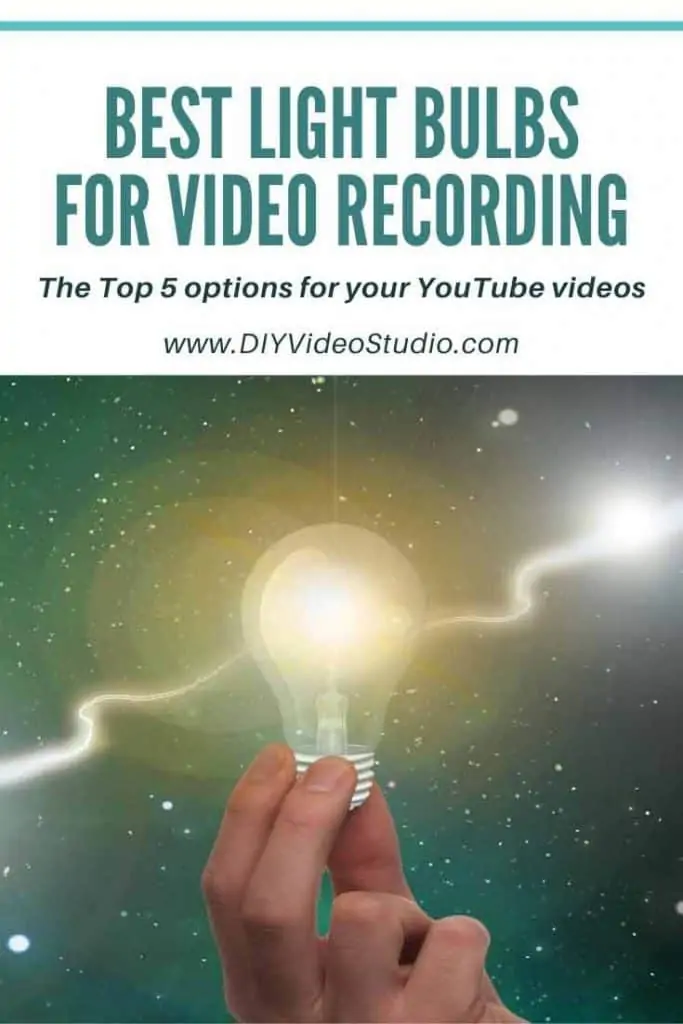
The important thing to remember is that good lighting depends on having the right kind of lighting kit, that’s especially true if you are using a smartphone or budget camera. Budget and entry-level cameras tend to produce more video noise in lower light, so better lighting will help improve the image quality.
Part of improving your video or photography lighting is about choosing the best light bulbs for youtube videos or what type of bulb is best for youtube videos. I don’t mean that certain types of video need a specific kind of light bulb. No, it’s about getting the best light bulbs to start with and then your lighting kit will perform at its optimal level. This includes the bulb’s color temperature, the way the light renders colors, the power output, or wattage, of the bulb, and the type of bulb.
So whether you are looking for the best softbox light bulbs for video or the best light bulbs for indoor photography, I’ll explain what you need to know and give you several options.
Essential light bulb basics to know
There are three essential pieces of knowledge you need to understand to be able to understand which are the best light bulbs for your youtube home studio videos.
These are the color temperature, the color rendering index, and the type of light bulbs. I’ll explain each of these before recommending a few specific light bulbs that would be ideal for your next YouTube video shoot.
The Color Temperature of light bulbs
The color temperature of a bulb is a way of describing how the light appears to us and is measured in degrees Kelvin or degrees K.
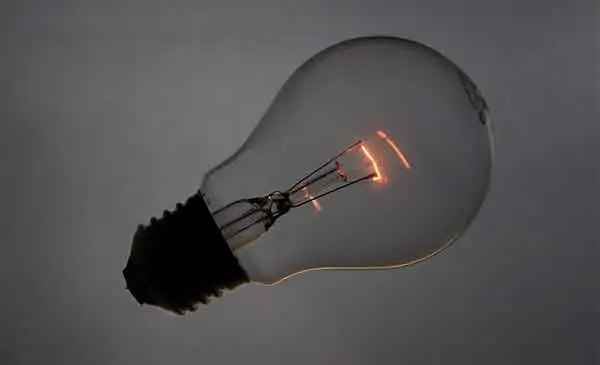
When an object is heated it emits light by incandescence starting by around 800K. Initially, it will glow a dull red but as the temperature of the object increases the color changes first to orange, then yellow, through to white. If the temperature of the object could be raised further it would start to glow blue. So the color of the object’s glow and its Kelvin temperature are connected.
So when we talk about the color temperature of a light bulb, it’s the color that would match that of an object at that specific Kelvin temperature, even if the light bulb isn’t actually emitting light by incandescence, such as a CFL or LED.
The Color Rendering Index of light bulbs
Color rendering is how a light bulb makes the colors and shades of an object appear to your eyes, compared to how it would look under an incandescent bulb.
The Color Rendering Index (CRI) is unrelated to the color temperature of a light bulb. It is a measure of how well a light renders the colors of an object and takes a value of between 0 and 100. A value of 100 would mean the light renders the color exactly the same as the reference incandescent light. So, the higher the CRI rating the better the color rendering ability of the light bulb.
For well-rendered colors and natural skin tones, you need to choose a light bulb with a high CRI value. It should be 80 or above, and ideally, be 90+. For example, a light bulb with a CRI of 96+ would make the colors of an object look very close to how they would look when lit by an incandescent light bulb. In a sense, the incandescent bulb would be the best lighting for video recording if it weren’t for all of its negative points.
Continuous Lights
You may see the light bulbs described as continuous or constant lights. As the name suggests, once they have been switched on they remain on. This is to make it clear they are not strobe lights as used by many photographers.
Although continuous lights can be used by photographers these are the type of lights videographers need to you, since obviously you do not want your lights to be intermittent.
Understanding light bulb lifetime
When buying light bulbs you will often see the average lifetime or Average Rated Lifetime hours (ARL) quoted on adverts and packaging. For instance, the Neewer 85W Tri-Phosphor Spiral CFL average lifetime is 7300hrs. But that does not mean all of those Neewer bulbs will last that long. It is only an average lifetime before a certain percentage of those bulbs fail. In general, if that percentage of failed bulbs is about 50% the average lifetime will be in the several thousand, like the Neewer CFL bulb example. But if the percentage of failed bulbs is 95% then the average lifetime can be into tens of thousands of hours.
So what does this really mean? Even for a good brand of a light bulb, it is normal that some bulbs will fail relatively quickly, a great deal will last for many thousands of hours, and some will last many tens of thousands of hours. You could be very unlucky and have a bulb fail after a couple of months, or be very lucky and have a bulb last 15 or 20 years. For instance, although the expected lifetime of an incandescent bulb is only 750 – 2,000 hours, the Centennial Light is the longest-lasting light bulb and has been burning almost continuously since 1901.
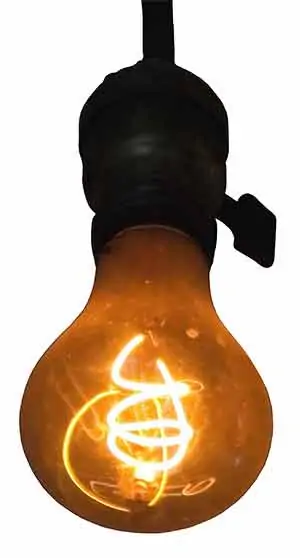
Another important point is that the average bulb lifetime will have been determined under perfect conditions. Things like rough handling, extremes of temperature, electrical surges, vibration, and whether you leave your light kit permanently set up or not will affect bulb performance and lifetime.
The types of light bulbs for recording videos
Now that you understand the color temperature and color rendering index of light bulbs you are better placed to choose the bulbs for your YouTube lighting kit. However, you should also know there are three types of bulbs used in studio lights.
Although I’ll list what I consider to be the best light bulbs for youtube videos later in this article, let me first describe the three bulb types.
Incandescent light bulbs
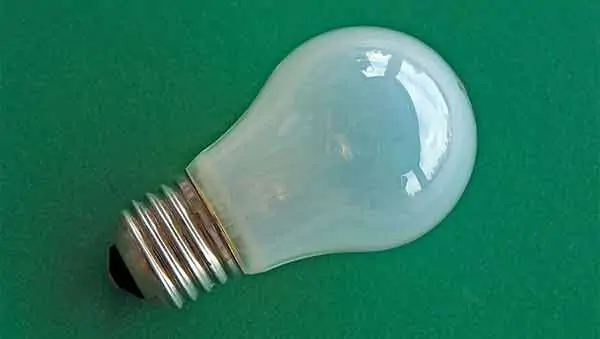
Incandescent light bulbs are like general-purpose home light bulbs. An electric current heats a coiled tungsten metal filament, causing it to glow.
Since the color rendering index was based on the color spectrum of incandescent bulbs, they, have a CRI value of 100 and render colors beautifully.
Unfortunately, incandescent bulbs convert most of the electrical energy into heat, making them very inefficient. Not only are they inefficient, but they also get extremely hot. This can represent a fire risk if fitted in typical video light kits sold on Amazon and eBay, such as softboxes, umbrella reflectors, or other light modifiers.
Although cheap, incandescent lights have a relatively short expected lifetime, which is shortened even further if you handle them roughly while hot.
Because of their inefficiency, incandescent bulbs have been banned in many countries, but existing stocks may still be available. Many YouTube newbies may also look at work lights whose light heads have 500W tungsten-halogen tube bulbs.
For a few reasons, I would urge you not to use more appropriate types of light bulbs for your video production.
Compact Fluorescent Lamp (CFL) light bulbs
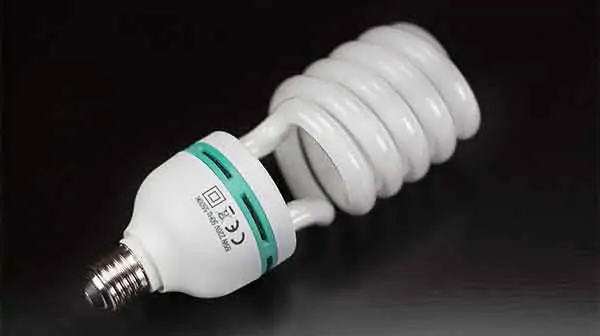
A CFL makes a much better choice of light bulb for a home video studio lighting kit than an incandescent bulb. In fact, they are used by many photographers and videographers to power their continuous light kits.
They are like mini ceiling tube lights but are obviously much smaller, with a compact helical design. Like ceiling tube lights they contain mercury, which is toxic, so care must be taken at their disposal.
Unlike common fluorescent ceiling tube lights, CFL light bulbs for video recordings contain improved phosphor formulations to raise the CRI value, improving the color rendering, which is especially important for skin tones.
Although CFL light bulbs do get hot, they do not get as hot as incandescent bulbs. They also have a much longer lifespan and are more efficient than incandescent bulbs. So although they are more expensive to buy, over their lifetime they represent a considerable saving due to being more efficient.
The drawbacks of CFL light bulbs are that they tend not to be dimmable, they’re fragile, and you have to dispose of them carefully because the mercury they contain is toxic.
CFL light bulbs are frequently available at 35W, 45W, 85W, and 135W power ratings.
Source: Wikipedia
LED Light Bulbs
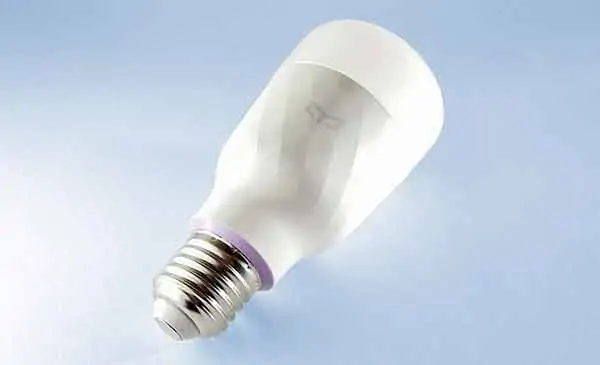
Daylight LED bulbs have been adopted by photographers and videographers for lighting relatively recently. But in just a short period of time, they have become the most popular type of light bulb for lighting professional and YouTube videos. It’s not difficult to understand their rise in popularity. They are physically far more robust than either incandescent or CFL light bulbs, they are meant to last much longer, and they are much more efficient. For many, LEDs represent the best lighting for home video recording and are considered one of the best softbox light bulbs.
The first generation of reasonably priced LED lights had a rather poor CRI rating, making it difficult to record realistic skin tones with a video camera. Advances with phosphor coatings mean LEDs can produce good quality white light. The best examples can have CRI ratings of 96 or 97, but they are more expensive.
Although LEDs cost more, their higher efficiency of about 85% means that over their lifetime they actually represent a considerable saving for the user. In addition, they do not contain toxic mercury like CFP light bulbs. Therefore, switching over to LED light bulbs is beneficial for both your business and the environment.
As more advances in LED technology come along, and manufacturing efficiencies increase prices will fall and it is likely LED bulbs will eventually replace CFL light bulbs.
The best light bulbs for recording YouTube videos
Now that you have a better understanding of video lighting basics here are two LED and three CFL video light bulbs I feel confident in recommending.
Note that because LED light bulbs are more efficient than CFL bulbs. So when comparing LED and CFL bulbs of equal power rating, the LED will be the brighter bulb. Very approximately incandescent bulbs produce 14 lumens per watt, CFL bulbs produce 63 lumens per watt, and LEDs produce 74 lumens per watt.


![LimoStudio [1 Pack] 45 Watt, 5500K Fluorescent Daylight Balanced Light Bulb...](https://m.media-amazon.com/images/I/31uLrmtRjOL._SL160_.jpg)
![LimoStudio [4 Pack] 85W 5500K CFL, Compact Fluorescent Light Bulb for...](https://m.media-amazon.com/images/I/31Exvw+ZiOL._SL160_.jpg)



![LimoStudio [1 Pack] 45 Watt, 5500K Fluorescent Daylight Balanced Light Bulb...](https://m.media-amazon.com/images/I/31uLrmtRjOL._SL160_.jpg)
![LimoStudio [4 Pack] 85W 5500K CFL, Compact Fluorescent Light Bulb for...](https://m.media-amazon.com/images/I/31Exvw+ZiOL._SL160_.jpg)

Last update on 2025-10-20 / Affiliate links / Images from Amazon Product Advertising API
LOHAS A21 LED 23W Daylight 5000K Light Bulbs (4 pack)
The LOHAS A21 LED bulb is primarily designed for indoor use in the home and public areas such as offices, hotels, schools, etc. However, it can easily be used to replace lower wattage CFL bulbs in video lights since it has an E26 medium screw base. These bulbs are bright, producing a Luminous Flux of about 2500 lumens with a Daylight color temperature of 5000K and a CRI rating of 80+.
In terms of brightness, these bulbs fall somewhere between a 35 and 45W CFL bulb. They are not dimmable, and as expected, when in use they become a little warm to the touch but no more than a normal 25W incandescent bulb. The heat is confined to the main body and not the rounded bulb cover, which remains cool to the touch.
The LOHAS LED bulbs are roughly the same size and shape as standard incandescent bulbs for the home but heavier. Although rated at only 23W, these bulbs produce a lot of light. But it would be even better if they were available at higher power ratings. I like the fact that they switch on instantly to full power, whereas CFLs take a minute or two to reach their full brightness.
These 23W bulbs are bright enough to merit being included in this list. It does make a good LED bulb for video. They do not flicker or get too hot, and their LED technology makes sure they are highly efficient. The diodes are protected inside a plastic body, making the light bulbs very durable. You could drop these bulbs on its rounded end and expect it to still work, although I don’t suggest you do so.

I like these bulbs a lot and have used them as softbox light bulbs for a video course I recently recorded at home.
I used a single LOHAS 23W LED bulb in a photography E27 bulb holder on a light stand and added a Neewer 32 inch Octagonal Softbox Umbrella. I put this single light above and behind my Canon EOS R camera, and about 9ft from me. I think the results were good enough for my video course. For reference, I was using my Canon EOS R, an EF 50mm, an aperture of f/1.8, and an ISO of 320.
Size: D: 2.8 inches L: 5.2 inches. Base type: E26
LOHAS A21 LED 23W Daylight 5000K Light Bulb Pros and Cons
| Pros | Cons |
|---|---|
| Bright & flicker free | Could be brighter |
| Reaches max brightness immediately | |
| Good value for money | |
| Do not contain mercury | |
| Energy efficient |
Bonlux 40W Daylight 5500K LED bulb
The Bonlux 40W corn cob LED bulb is designed to replace CFL bulbs in the 150-200W range with a medium screw base (E26/E27). It delivers a Luminous Flux of 3500 lumens with a Daylight color temperature of 5500K and a CRI rating of 80, making it directly comparable to many CFL Daylight bulbs. I would like to see the bulb covered by a protective transparent or opaque outer casing for protection and to soften the light. However, the uncovered design is probably deliberate to aid cooling.
This LED bulb is reasonably priced and holds up well. If you shoot videos at client’s premises other venues these should prove more durable and produce less heat than the CFL bulbs they are designed to replace. It’s a no brainer direct replacement that offers similar or slightly better performance and works well in light heads that take multiple bulbs.
Size: D: 2.4 inches L: 7.9 inches. Base type: E26
Bonlux 40W Daylight 5500K LED bulb Pros and Cons
| Pros | Cons |
| Fits existing softboxes and umbrella light kits designed for CFL bulbs | A build-up of heat in the core |
| More durable than CFL bulbs | Surface mounted diodes exposed |
| Brighter than expected | |
| Good quality light output | |
| Less hot than CFL bulbs | |
| Large power saving |
LimoStudio 45 Watt, 6500K Full Spectrum Daylight CFL Light Bulb
The LimoStudio 45 Watt CFL light bulb is of a spiral design and intended to fit photography/videography lighting kits, such as softboxes and umbrella lights with a medium screw base (E26/E27). It is a small to medium size CFL with a diameter of 3 inches and a length of 8 inches. This 6500K Daylight bulb produces 2850 lumens of pure white light, with a CRI value of 80, which is common amongst CFL light bulbs. In short it is more than good enough for use in YouTube studio lights.
Because this LimoStudio bulb is only 45W don’t expect to be able to light a large area with just one bulb. Singularly it would suit being used for small product shots or as a fill light. When fitted to softboxes with multiple bulb mounts, much larger areas can easily be lit with these bulbs. If your softbox has only one socket you may be able to upgrade it to take 4 bulbs by using the LimoStudio LimoStudio 4 in 1 Socket Adapter.
As with other CFLs, this LimoStudio bulb is one of the most efficient ways of lighting a home video studio, providing up to 80% energy savings over using an incandescent bulb. Small cracks may appear on the base but these do not seem to affect the performance.
Size: D: 3 inches L: 8 inches Base type: E26/E27 standard base
LimoStudio 45 Watt, 6500K Full Spectrum Daylight CFL Light Bulb Pros and Cons
| Pros | Cons |
| Good for the price | Small cracks may appear on the base |
| Long lasting | Not for lighting larger areas |
| Includes a fire retardant | |
| Energy saving |
LimoStudio 85 Watt, 6500K Daylight CFL Light Bulb (4 Bulbs)
The 85W Daylight CFL is the big brother of their 45W bulb. You still get all of the bright white daylight illumination but it’s brighter. Just like the 35W bulb the glass section of the 85W bulb is spiral-shaped but bigger.
The light bulb is 3 inches wide, 10 inches long and a little heavier than the 45W bulb. It will fit softbox/octabox/umbrella lights with a standard Edison E27/E27 base socket.
These are energy-saving bulbs with a CRI value of 80 and meant to be equivalent to a 350W incandescent light bulb. The expected lifetime is 8,000hrs, so you could look forward to years of use. This pack of 4 bulbs represents good value for money when looking for the best lighting for video recording. They deliver plenty of light for your YouTube filming, and although they are primarily intended to fit the LimoStudio series of softboxes they will also work in lights from other brands.
Size: D: 3 inches L: 10 inches Base type: E26/E27 standard base
LimoStudio 85 Watt, 6500K Daylight CFL Light Bulb
| Pros | Cons |
|---|---|
| Good value for money | A little bulky |
| Good daylight tone | |
| Long lasting | |
| Energy saving |
Neewer 85W 5500K Tri-Phosphor CFL Daylight Balanced Light Bulb
The Neewer 85W CFL daylight balanced bulb uses three phosphors to help better fill the visible region of the spectrum and thus improve its ability to render colors correctly. The result is that this bulb has a CRI value of 90 and is better at rendering colors than standard CFL bulbs with a lower CRI. So if you want your colors to be more vibrant and true-to-color, especially skin tones, consider buying a tri-phosphor CFL bulb like this one from Neewer.
The bulb has an E27 base that will fit most standard photography/video fixtures. It’s designed to produce ultra-soft light to help reduce harsh shadows. The bulb is eco-friendly since it’s fluorescent technology uses 80% less energy than the equivalent incandescent bulb. The 5500K color temperature matches daylight well if you are recording videos in a room with windows.
There is no visible flicker or noise from the bulb and the average lifetime is around 8,000hrs. Since this is a large and higher power lamp you can expect the spiral part to get hot during extended use.
Base: E27
Neewer 85W 5500K Tri-Phosphor CFL Daylight Balanced Light Bulb
| Pros | Cons |
|---|---|
| Helps you record natural tones | Large |
| High CRI of 90 | Gets hot |
| Long lifetime |
Conclusion
There are many bulbs you can choose from when it comes to equipping your home video studio or photography studio. But there really are only two technologies you should be considering. These are Compact Fluorescent Lamps (CLs) and LEDs. Both have their merits and in your situation, you may have a specific preference.
The bulb you choose will depend on your requirements. If you are doing product shots of smaller items or head and shoulder talking head videos then a lower power bulb will be ample. In both cases, you can move the softbox closer to your subject. But if you want to light a larger scene you will need more power, either a single higher power bulb in each softbox or multiple lower power bulbs and a 4 in 1 base adapter.
The five bulbs in this selection are all good replacements for CFL bulbs in your existing light kits. If you want to stick to using CFLs that’s great, there are three good ones to choose from in this list. The LimoStudio CFLs represent good value for money while the Neewer offers better color rendering but at a slightly higher price.
The current trend is towards LED lighting for very sensible reasons. They are not as fragile as glass CFL bulbs and I have even seen some people bounce the LOHAS A21 type of bulbs off a tabletop without any apparent damage. Unfortunately, LED technology is not as mature as that of fluorescent lighting, but it’s catching up very quickly and prices are falling.
There are many examples of high-quality LEDs with exceptionally good CRI values available in professional video lighting but they come with a professional price ticket. If you are looking for dimmable lights you might prefer to upgrade to LED light panels and either add a pop-open softbox or buy a parabolic softbox and mount an LED panel light where you would normally have a flashgun. Daylight balanced LED bulbs are the future.
Tosh Lubek runs an audio and video production business in the UK and has been using the Canon EOS R since it was released in the Autumn of 2018. He has used the camera to shoot TV commercials for Sky TV, promotional business videos, videos of events and functions, and YouTube creator content. He has also won international awards for his advertising and promotional work. You can meet by visiting his “video booth” at HashTag business events across the country.
Recent Posts
Most people use sandbags the wrong way. Here’s how to hang them properly on a light stand for maximum stability and safety — plus what to fill them with.
You're Using the Canon RF 50mm f/1.8 WRONG! Here’s How to Fix It
If you’ve recently picked up the Canon RF 50mm f/1.8 STM—affectionately known as the Nifty Fifty—you might be confused by that strange switch on the side of the lens. It doesn’t say AF/MF...


